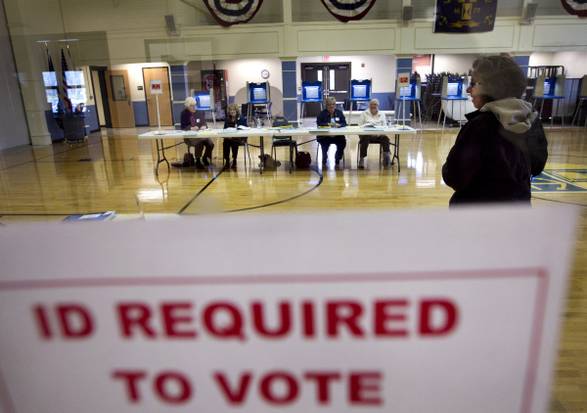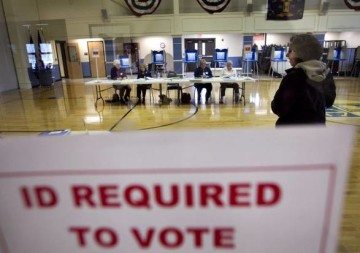
Years After Voter ID Law, Alternative IDs Confuse Texas County Officials
Critics say rarely issued election identification certificates are more 'illusion' than 'remedy.'


More than four years have passed since the Republican-controlled Texas Legislature passed a controversial voter ID law, one of the strictest in the nation. At the time, civil rights groups and Democrats pointed out that hundreds of thousands of Texans lacked a driver license or other government-sanctioned forms of photo ID, and that cost and access could be a barrier to acquiring them. In one of the few concessions to opponents, Republicans agreed to create a new form of ID, the election identification certificate (EIC). The EIC is free to any qualifying voter as long as you can produce some combination of an array of underlying documentation, such as a birth certificate, Social Security card and proof of residence.
But years into the voter ID experiment, the EIC has been all but forgotten — by voters and by elections administrators alike.
In the three years since Texas began issuing EICs, the Department of Public Safety (DPS) has issued only 653 EICs across the state — only one ID for every 930 Texans who lack voter ID.
In a survey of 46 counties that issue their own EICs, the Observer found that many elections administrators had little to no familiarity with the ID, and some expressed surprise that anyone would inquire about it.
Most of Texas’ 254 counties have a DPS driver license bureau equipped to issue EICs. But at least 68 counties in rural, sparsely-populated parts of the state lack a DPS office. Of those, DPS deploys a mobile unit to 22. The remaining 46 counties issue EICs through their county offices. We were able to speak with elections personnel in 32 of those counties.
Employees at three of the counties we called — Kinney, LaSalle and Lynn counties – said they had never heard of EICs, and couldn’t direct us to place to learn more. (DPS has information on its website.) LaSalle County has issued three EICs since 2013, according to DPS data.
“About what?” said an employee at Lynn County Tax Assessor-Collector’s office, when the Observer called to ask about obtaining an EIC. “I have no idea. We do vehicle registration here — I’ve never heard of that.”
Some county officials noted that few, if any, people had requested one.
“We’ve had the equipment back here for two years but we’ve never had to use it,” said an employee of Jack County, population 9,000.
Employees in other counties suggested obtaining other forms of ID or going to a different county.
“You sound so young — most young people have a driver’s license,” the elections administrator in Fayette County told an Observer reporter, suggesting the EIC was unnecessary. The official went on to discourage the reporter from pursuing an EIC, adding, “It’s not like a driver’s license and it’s not like a personal ID from DPS,” she said. “It can only be used for voting.”
The EIC, which is laid out vertically, has a yellow border along the bottom that declares FOR ELECTION USE ONLY. What’s more, if a voter has either a driver license or state ID, he or she must surrender it before getting an EIC. So, no chance for backup ID.
Eventually, the Fayette official suggested making an appointment at her office. But first, she said, she’d have to call DPS to “activate the system.”
“You have to call at least 24 hours ahead of time,” she said. “It’s not mandated on the website but it is mandated from me, so I can be sure to make arrangements to be here. I might not be in the office, if I have an appointment or if I already had something planned to be out of the office. I wouldn’t want you to waste your time.”
In an email to the Observer, DPS spokesperson Tom Vinger wrote that county offices receive the same in-person training as DPS staff and “refresher training and training for new county employees will be provided upon request.”
The memo, it seems, has not reached some counties.
“Oh, I have no idea, the guy who was doing that isn’t employed here anymore,” said an employee of the Edwards County Sheriff’s office, when asked about EICs. “He left a long time ago.”
The system arguably presents a “chicken or the egg” dilemma. Because so few EICs have been issued, many county employees aren’t familiar with them. Because many county employees aren’t familiar with EICs, few are issued.
Nina Perales, vice president of litigation at Mexican American Legal Defense and Educational Fund, said that without widespread voter education, the EIC does little to mitigate the consequences of Texas’ voter ID law.
“We don’t see a lot of voter education in Texas anyway,” Perales said. “The EIC is really more of an illusion than it is a remedy.”
Lorenzo Holt also contributed reporting for this piece.


